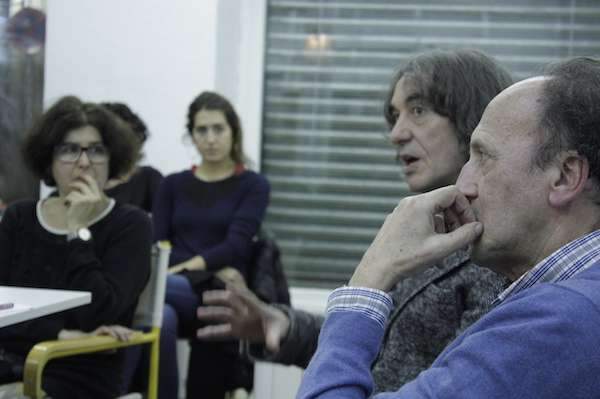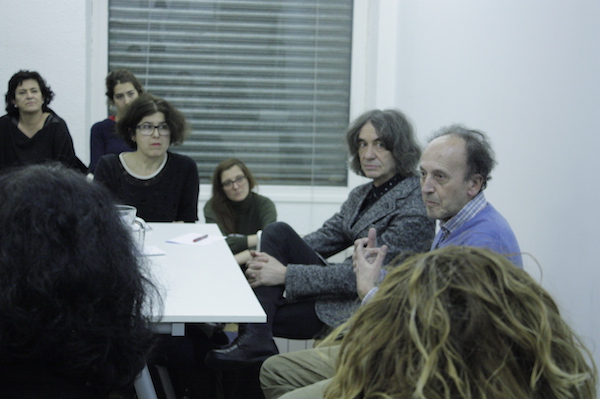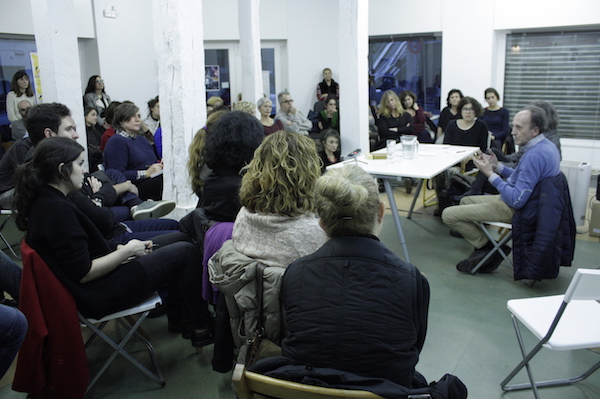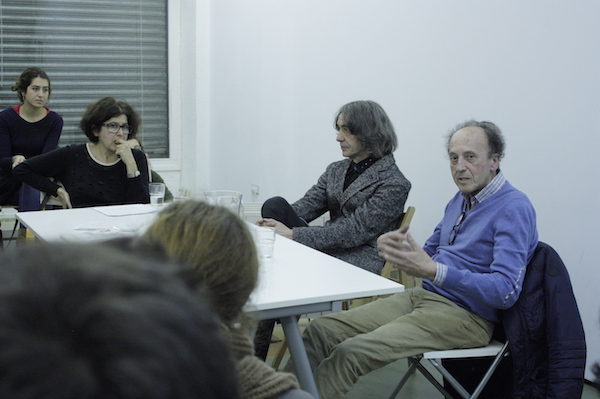Forms of formless knowledge
“ROBA DA MATTI”. SEMINAR ON MADNESS. SUSANA TALAYERO
by
The seminar “Roba da matti” came out of a personal interest of mine in madness. With it, I would like to explore issues bordering on the psycopathological, madness, and psychiatric institutions. It sets up a dialogue between Silvano Agosti’s documentary Il volo (1975), psychoanalyst José María Álvarez, and psychiatrist Fernando Colina; both of whose clinical practice questions means and manners of treating pathologies.
I have been wanting to share Silvano Agosti’s filmography for some time now, and to take it to Bilbao. Agosti is an Italian filmmaker and friend of mine. I had at first thought of showing his documentary Il volo at an Illegal_cinema session in Bulegoa z/b. Then I met José María Álvarez, a psychoanalyst, at a seminar, and then through him, Fernando Colina, a psychiatrist. I read some of their books and thought it might be interesting to set up an encounter with them, using the film as a tool to work with. That was how the seminar “Roba de matti” (“Crazy stuff”), the title of which refers to an Italian colloquial expression, came about.
Il volo is a documentary by Silvano Agosti from 1975, commissioned by psychiatrist Franco Basaglia. The film records a practical experience from the Trieste psychiatric ward during the anti-psychiatry movement, when a hundred patients left the ward and went on a plane trip. It proposes other ways to rethink the spaces surrounding madness and suggests ways of bringing change into psychiatric institutions. I made the video Si vola in 2012 in reference to this film.
Using a film as a departure point for a collective exercise in thinking, “Roba da matti” proposes we reconsider madness and how it extends into the present. In Agosti’s words, “Madness is the way people’s lives are forced to organise themselves. Madness comes out of that restriction.” The filmmaker also takes up Seneca’s question, “Who will heal those who believe themselves to be healthy?”
The seminar “Roba da matti” is a proposal by Susana Talayero. It will take place between 17.00 and 20.00.
PROGRAMME:
17.00-17.20: presentation by Susana Talayero
17.20-18.00: screening of Il volo by Silvano Agosti
18.00-18.30: intervention by José María Álvarez
18.30-19.00: intervention by Fernando Colina
19.00-20.00: discussion
BIOGRAPHIES
Silvano Agosti (Brescia, 1938). Defines himself as a human being, filmmaker and writer. He studied at the Centro Sperimentale di Cinematografia, Roma, where he later taught film montage. In Moscow, he specialised in Eisenstein’s work. After working with Marco Bellocchio on I pugni in tasca (1967), he brought out the feature film Il giardino della delizie (1971). His little-known filmography has been censored in Italy and is representative of filmmaking in the 70s that came out of a political commitment which extended into all aspects of film production. He has been running his cinema Azurro Scipioni, which is a reference for independent and art film in Rome for three years now. Films by him include N.P.il segreto (1973), Matti da slegare (1975), D’amore si vive (1984), Quartiere (1987), L’uomo proiettile (1995), and La seconda ombra(2000). http://www.silvanoagosti.com/
José María Álvarez (León, 1960). Psychoanalyst and member of the World Psychoanalysis Association, he specialises in Clinical Psychology at the Rio Hortega de Valladolid University Hospital, where he does clinical work and teaches. He is committed to public health. Written works to date: La invención de las enfermedades mentales (1999), Fundamentos de la psicopatología psicoanalítica (2005) and Estudios sobre la psicosis(2006).
Fernando Colina (Valladolid, 1947). Psychiatrist in charge of the psychiatry service at the Rio Hortega de Valladolid University Hospital. Colina has been turning his experiences as a psychiatrist into writing for years now. Written works include Escritos psicóticos (1996), Cinismo, discreción y desconfianza (2001) and El saber delirante (2010). His most recent book, Sobre la locura (2013), is a critical essay against trends in modern psychiatry and its propensity to medicate rather than listen to its patients.
José María Álvarez and Fernando Colina belong to La Otra Psiquiatría, which “is mostly a group of friends. Apart from being friends, we’re interested in studying psychopathology and psychoanalysis, in dealing with madness, working with medical institutions and training residents in Clinical Psychiatry and Psychology. It’s not a professional or scientific association, and will never be a part of either of those.”
http://www.laotrapsiquiatria.com/
Álvarez, Colina and psychiatrist Ramón Esteban together founded the Valladolid group Los Alienistas del Pisuerga, which has published eight volumes that recover classical texts in psychopathology. “Alienists who endeavour not to lose their liking for the clinic, their respect for their patients’ subjectivity, extreme politeness, the rigour of combining humour, irony and misunderstanding with exact diagnoses and our firm support for a type of clinical practice which draws on history.”
Susana Talayero (Bilbao, 1961). Artist based in Bilbao. She studied Fine Art with the UPV-EHU and lived in Rome from 1986 to 1996. Her work runs between drawing, painting and video. Her most recent solo exhibition was Cabezonas (2014), at Galería Carreras Múgica, Bilbao. She occasionally develops educational projects for day hospitals and psychiatric hospitals, in collaboration with the DEAC, Centro-Museo de Arte Vasco de Arte Contemporáneo Artium, Vitoria-Gasteiz, and other centres.




